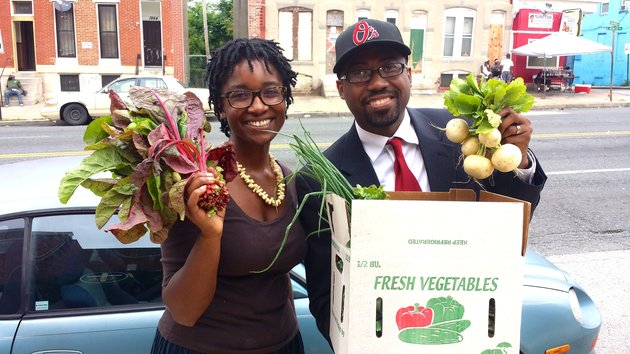Jesus made a revolutionary statement when he stood on the Mount of Olives and declared: “For I was hungry and you gave me something to eat, I was thirsty and you gave me something to drink, I was a stranger and you invited me in. … Truly I tell you, whatever you did for one of the least of these brothers and sisters of mine, you did for me.”
Today, millions around the world live without food security — access to safe, nutritious food. A group of pastors, farmers and community leaders in Baltimore — where one in four residents lives in a food desert, according to the Johns Hopkins Center for a Livable Future — are joining forces to tackle the issue head on.
Rev. Dr. Heber Brown, who heads Pleasant Hope Baptist Church in Baltimore, is spearheading the Black Church Food Security Network in conjunction with the Baltimore Food and Faith Project of the Johns Hopkins Center For a Livable Future and Black Dirt Farm, a local group of urban farmers who grow food on the historic land of Harriet Tubman on Maryland’s Eastern Shore. Their aim is to bring together black churches and black farmers to provide their communities with healthy, nutritious food.
The network is launching with two events — a worship service and produce sale on Wednesday at Ark Church, a partner house of worship, and an urban gardening project on Saturday at the 1800 block of Aisquith Street.
“Food deserts in Baltimore overwhelmingly affect black people,” said Darriel Harris, an ordained minister and project officer of the Baltimore Food and Faith Project. “The black church is an institution that is both housed in these areas and managed by people who live in or have significant ties to these areas.”
The U.S. Department of Agriculture defines a food desert as an urban neighborhood or rural town that lacks easy access to fresh, healthy and affordable food. Such communities are often served only by fast food restaurants or convenience stores where fresh foods are scarce. Residents frequently suffer from obesity, diabetes and heart disease as a result of poor diets.
Food deserts are by and large found in lower-income areas — and they affect black and Hispanic neighborhoods in particular. In a study published in October 2013, Johns Hopkins researcher Dr. Kelly Bower found that at equal poverty levels with their white counterparts, black neighborhoods had fewer supermarkets.
In Baltimore, 34 percent of the city’s African American population lives without access to fresh, healthy foods, compared to just 8 percent of white residents.
The Black Church Food Security Network, Harris told The Huffington Post, is an example in which “those most impacted by the problem have come up with a solution.”
Food justice came to the forefront of Brown’s mind five years ago when he was a new pastor at Pleasant Hope and found himself visiting members of his congregation in the hospital up to four times a week. “I realized the people I served were in the hospital, many of them, because of diet-related issues,” he told HuffPost.
At that point, he and the staff at Pleasant Hope transformed the church’s yard into a small urban garden, which today produces 400-500 hundred pounds of fresh produce each season. The church’s bounty — which includes broccoli, tomatoes, kale, beets, radishes and more depending on the season — is available by donation after Sunday service.
When violence broke out following the death of Freddie Gray in April, Brown said, the reality of food deserts became painfully apparent. “Many corner stores were affected during the uprising and out of commission. Entire neighborhoods were hungry and without food.”
The pastor spent his days driving food from the church’s garden around to various pick-up spots around the city, but it was time to take the initiative further. With the help of Black Dirt Farm and the Baltimore Food and Faith Project, the Black Church Food Security Network was born. Both Brown and Harris hope to scale the network so that churches around the city become “conduits of health.”
“The black church is a lasting institution in the black community and general community that specifically is vested in the life of black people,” Harris said. “What better institution to address a problem that negatively impacts so many blacks?”
“Faith communities teach us how to live. With healthy food being such an integral part of a vibrant, full life, it is only natural for faith communities to take on the issue of food security, and healthy eating.”
Source: Huffington Post

















































































































































































































































![[Video] Chicago Police Officers Caught On Video Telling Two Black Men "We Kill Mother F**kers"](https://earhustle411.com/wp-content/uploads/2018/07/evil-cop-3-300x180.jpg)
![[Video] Chicago Police Officers Caught On Video Telling Two Black Men "We Kill Mother F**kers"](https://earhustle411.com/wp-content/uploads/2018/07/evil-cop-3-80x80.jpg)












![[Video] White Woman Calls The Cops On Black Real Estate Investor, Cops Threaten To Arrest Her For Harassing Him](https://earhustle411.com/wp-content/uploads/2018/05/nosy-neighbor-300x180.png)
![[Video] White Woman Calls The Cops On Black Real Estate Investor, Cops Threaten To Arrest Her For Harassing Him](https://earhustle411.com/wp-content/uploads/2018/05/nosy-neighbor-80x80.png)


![White Scientist Says The Black Community Is Being Targeted By The Medical System, They Are Deliberatly Being Poisoned [Video]](https://earhustle411.com/wp-content/uploads/2016/05/mike-adams-300x180.jpg)
![White Scientist Says The Black Community Is Being Targeted By The Medical System, They Are Deliberatly Being Poisoned [Video]](https://earhustle411.com/wp-content/uploads/2016/05/mike-adams-80x80.jpg)








![Teenage Girl Shot In Her Stomach Three Times But Took Time To Post To Facebook [ Video]](https://earhustle411.com/wp-content/uploads/2016/02/Gangster-chick-300x180.jpg)
![Teenage Girl Shot In Her Stomach Three Times But Took Time To Post To Facebook [ Video]](https://earhustle411.com/wp-content/uploads/2016/02/Gangster-chick-80x80.jpg)







